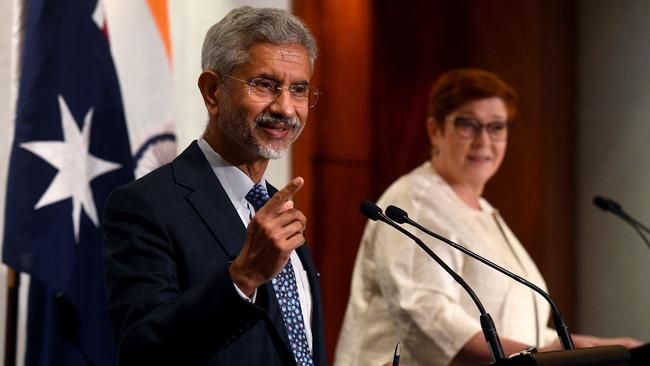
Yet less than a fortnight later India could not even bring itself to join a UN Security Council vote deploring Russia’s aggression against Ukraine, instead lamely urging doomed “diplomacy and dialogue”. India joined China (no surprise there) in abstaining and Indonesia lamented the invasion but failed to name Russia as the aggressor.
Vladimir Putin’s Ukraine invasion has thrown a spotlight on hopeful assumptions about the security of every country, however geographically distant from Ukraine, including Australia. The obvious conclusions include: deterrence against aggression that ranges from insidious influence to military attack must be strong and credible; stepping over red lines must incur truly painful penalties; and alliances, and rhetorically warm relationships, including the Quad, which brings together Australia, the US, Japan and India, must translate into genuine solidarity through action.
The underlying lessons are that in today’s troubling times, a sovereign nation must apply itself to intensifying domestic support for core values, must invest in building its capacities to secure that sovereignty, and must deploy significant resources to bring friends and allies with it.
In the cruel case of Ukraine, deterrence obviously failed utterly. Despite the economic need of every country to maintain global connections, those of the size of Russia and China can survive at a lower level if their leaders can persuade, or force, their populations to cop the pain resulting from sanctions.
How bitterly Putin must have wept to hear of Russia’s disqualification from this year’s Eurovision Song Contest while European energy corporations ramped up their purchases of Russian gas immediately after the invasion.
Alliances – the core strategic differentiator between the West and the two big authoritarian powers – have faded frustratingly when tested, for all their brave words. That doesn’t mean that using international diplomacy to strengthen human rights, freedoms and democracies is doomed. But it has to be more realistic, more rigorous, backed up by effective defence commitments, and supported by united nations as well as by the United Nations. For before becoming bogged down disastrously in Ukraine, as we must hope, Putin won one round after another.
He has seized the Crimea, presided over the downing of Malaysia Airlines flight MH17 killing 298 people (of whom 38 were Australian citizens or residents), successfully backed fellow dictators (including through military assistance) in Kazakhstan, Belarus and Syria, and used novichok to kill or silence rivals.
China has pressed on with militarising the South China Sea despite an international tribunal strongly finding against it in 2016.
And look at North Korea. Few envy its lifestyle, yet it has joined permanently the ranks of nuclear armed powers, despite so much huffing and puffing to prevent this happening.When it came to the crunch as global pressure built to denuclearise North Korea, Beijing opted to maintain its crucial backing for Pyongyang.
So it has proved with China’s Russian connection. While the Soviet party thought 30 years ago that its problems lay in ideology and party orthodoxy, the Chinese Communist Party came to the opposite conclusion, with Xi Jinping lamenting: “To repudiate Lenin and Stalin was to wreak chaos.”
Now, from Beijing’s perspective, Putin appears to be salvaging Russia by embodying those dictators. They share a common enemy in liberal democracy in general, and in the US in particular. Russia, for long the dominant power, was effectively the sidekick until recently. Its economy, roughly the same size as Australia’s, is one-tenth that of China’s.
But Putin’s appetite for backing his bullying with military forays appears to have rebalanced the relationship for now. Outwardly, the personal rapport between the two leaders appears to add special value to the strategic partnership, with Xi calling Putin “my best, most intimate friend”.
They certainly make an odd couple. Xi wields massive authority within a regime unsurpassed in its capacity for surveillance and control. But he remains unreservedly wedded to the party that spawned him and that he needs to steer astutely, especially this year, as he looks to extend his rule at the crucial national party congress by five years at least.
In comparison, Putin now is restrained only by Russia’s economic incapacity, and increasingly defaults to raving. In a rousing 5000-word joint statement during Putin’s visit for the Beijing Winter Olympics mapping out no-limits co-operation, the leaders vaunted “redistribution of power in the world”. Beijing’s refusal to criticise a full-on invasion undermines its capacity to argue rationally against sanctions over its suppressing its own “borderlands” such as Xinjiang and Hong Kong. But Xi seems little bothered about such niceties.
Not only for Ukraine but also for Australia and our neighbours, it’s crunch time to embark on a better and safer course.
Rowan Callick is an industry fellow at Griffith University’s Asia Institute.




Last month the Quadrilateral Security Dialogue, on which expectations rapidly have been heaped, brought Indian External Affairs Minister Subrahmanyam Jaishankar to Melbourne for a high-level, high-fives-all-around meeting.